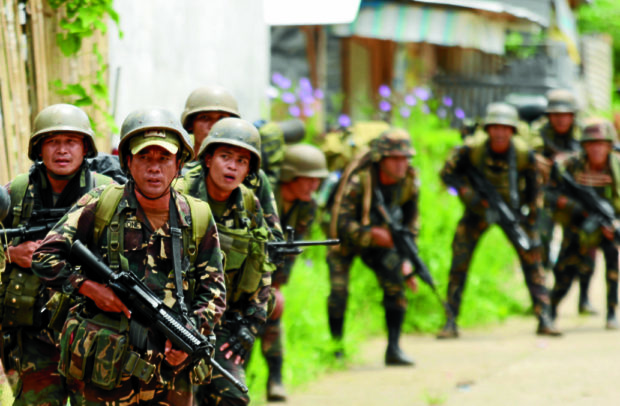Soldier’s life: Staring death in the face

Soldiers maneuver street by street and block by block to rid Marawi City of Islamist terrorists. PHOTO BY JEOFFREY MAITEM / INQUIRER MINDANAO
MARAWI CITY — Government soldiers fighting to finish off members of a homegrown terror group had stared death in the face during clashes here, trading gunfire with what some soldiers described as suicidal gunmen in close quarter battles that brought them as near as five meters to their enemies.
One soldier, Army Sgt. Erlito Pacaña, said he and other soldiers were sent as reinforcements for government forces pinned down by Maute Group members on May 23 when they saw how the terrorists fought.
Pacaña, 29 and native of Dipolog City, said he and other soldiers were on their way to help an Army team taking heavy fire when they were met by an explosion.
“We were immediately fired upon by the enemies. We returned fire,” said Pacaña, who only later felt pain on his shoulder and realized he had been wounded in the blast.
“The enemies were so aggressive. They were willing to die,” Pacaña said.
Article continues after this advertisementHe said while no one in his team was killed, he and several other soldiers had been wounded and had to be evacuated amid heavy gunfire.
Article continues after this advertisementSurrounded
Pfc. Mark Erwin Rule, 24 and native of Zamboanga del Sur, was with several other soldiers when they received an order to proceed to the village of Basak Malutlut.
“When we arrived in Malutlut, we found that we were surrounded by enemies,” said Rule. “They were behind us, in front of us and on both sides of us,” he said.
Rule said he led his fellow soldiers to a narrow road, where two masked men in black overalls suddenly emerged.
“The other one fired his gun and I also fired mine and hit them both. We were about five to seven meters apart,” he said.
Rule said he was sure he hit the two men but was not certain if he killed them.
He and his team sought refuge behind a wall, where the gunmen tried to pin them down.
Like Pacaña, he learned only later that he had been wounded on the right arm.
“All I thought of was to hold on to our position and hit as many enemies,” Rule said. His wound was treated three days later.
He described the Maute gunmen as well-positioned in tall buildings and roofs of houses.
“We fought them for more than three days. I did not mind my injury. I just fought the best I can,” Rule said.
He said the gunmen were almost suicidal.
Call of duty
Sgt. Christopher Tamparong said he and other soldiers had to “hold the line” against “determined” gunmen.
“I cannot say how many of them were killed but even if some of their companions had fallen, they continued to move toward us,” he said.
Tamparong was hit by a bullet in the buttocks and might soon be re-deployed to the war zone. “That’s a soldier’s life, sir,” he said.
Even noncombatants were being targeted by terrorists’ snipers, said Sgt. Ronnie Halasan, who served as driver for a combat service support unit.
“I was bringing logistical support when sniper fire nearly hit me,” he said. He dodged several sniper bullets since the battle began on May 23.
“Even the job of a combat support driver was not easy,” said Halasan, who had been to many battles, including the Zamboanga siege.
“I’m nervous but it’s a soldier’s life,” he said. “You really don’t know if you get to live another day or die today,” he added.
Cpl. Joel Bejasa, a medic, said soldiers have to ignore their families’ fears. “This is call of duty,” he said. —ALLAN NAWAL